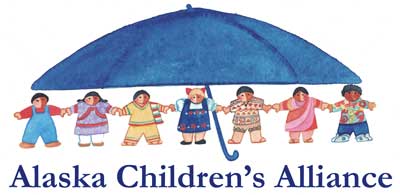About Us
The Alaska Children's Alliance supports Child Advocacy Centers and the multi-disciplinary professionals that serve victims of child abuse and their families.2025 Opportunities
Monthly, ongoing
• Peer group for CAC managers
• Peer group for MDT behavioral health providers
• Peer review and consultation group for MDT medical providers
• Support group for CAC Victim Advocates
• Peer review and consultation group for Forensic Interviewers
Want to get involved? We’d love to hear from you!
-ChildFirst Forensic Interview Training
April 28 – May 2, 2025 (Anchorage)
-ChildFirst Forensic Interview Training
September 29 – October 3, 2025 (Anchorage)
-2026 Conference on Child Maltreatment
September 29 – October 2, 2026 (Anchorage)
Marriott Anchorage Downtown
Registration will open about June 2026
What is the Alaska Children’s Alliance?
About Us
The Alaska Children’s Alliance (ACA) serves to support Child Advocacy Centers (CACs) and Multi-Disciplinary Teams (MDTs) throughout Alaska. Founded in 2001, we are an independent 501(c)3 and an accredited state chapter of the National Children’s Alliance, which sets national standards for best practices.
We strive to ensure that professionals throughout Alaska are equipped to do the best job possible at holding offenders accountable and helping children and their families to heal.
In Alaska, CACs accept referrals from the Office of Children’s Services (OCS) or Law Enforcement. If you have a concern about a child’s safety, please make a report to OCS at Child Abuse Hotline: 1-800-478-4444 or email: reportchildabuse@alaska.gov. If it is an emergency, please contact 911.
Our Services
- Individualized technical assistance: We offer customized technical assistance as needs arise from those in the field from CAC staff, MDT partners, and those from other communities who wish to develop a multi-disciplinary response to child abuse.
- Training: Child maltreatment is a specialized field that requires a high level of ongoing training. ACA coordinates training opportunities for professionals in the field- such as the Alaska Conference on Child Maltreatment and ChildFirst Alaska, a nationally recognized forensic interview training protocol.
- Peer review and case consultation groups: ACA supports discipline-specific groups that meet regularly to promote high quality services, accurate diagnosis, and best practice sharing.
- Network building: ACA convenes opportunities for CACs and multi-disciplinary partners to come together in sparking ideas, sharing best practices, and building relationships.
- Advocacy and education: ACA provides education to decisionmakers and within the community at large about child abuse, CACs, and the issues facing them.
- Stipends: Dependent upon CAC needs, stipends may include support with: travel, training, Zoom, continuing education fees, and subscriptions.
